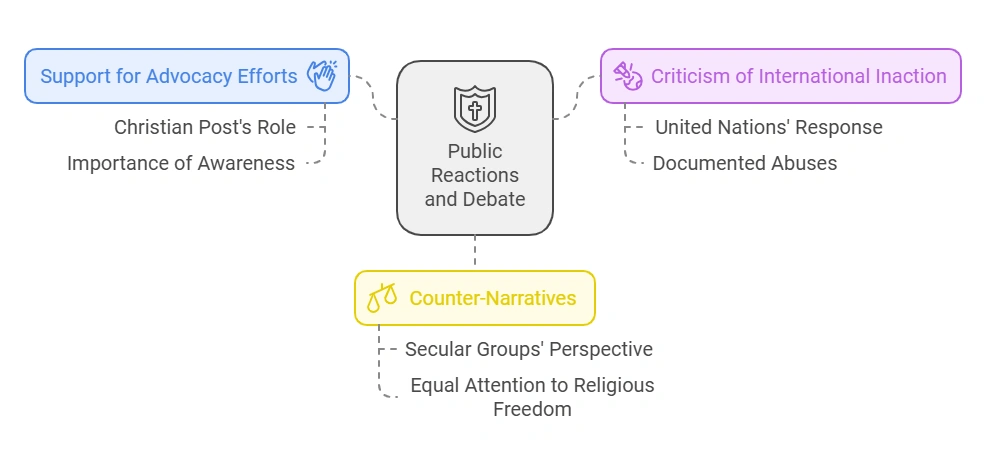
New York, U.S.— The Christian Post has released an in-depth investigation into the state of religious freedom worldwide, revealing troubling trends for Christians in numerous countries. The report provides a comprehensive overview of legal, social, and systemic challenges faced by Christian communities, underscoring the urgent need for global action to protect the right to worship and live according to one’s faith.
The findings reveal widespread persecution, legal restrictions, and social discrimination against Christians in regions ranging from the Middle East and Africa to parts of Asia and Europe.
Key Findings of the Investigation
1. Increasing Persecution in Authoritarian Regimes
- China: The report highlights how Christians face heightened surveillance, church closures, and arrests under President Xi Jinping’s regime.
- North Korea: Christians are forced to practice their faith in secrecy, with severe penalties, including imprisonment and execution, for those caught worshiping.
2. Legal Restrictions in Democratic Countries
- India: Anti-conversion laws are weaponized to target Christians, with growing incidents of mob violence against believers.
- Pakistan: Blasphemy laws disproportionately impact Christians, with many facing imprisonment or mob violence over unverified accusations.
3. Social Discrimination in Secular Societies
- Europe: Reports of Christians facing challenges to freely express their beliefs in the workplace and public spaces due to rising secularism.
- Middle East: Despite small gains in some countries, Christians continue to experience societal discrimination, limiting their access to education and employment.
Impact of Religious Freedom Violations
1. Displacement and Refugee Crises
- The investigation found that religious persecution is a leading driver of forced displacement, with millions of Christians fleeing conflict zones and oppressive regimes.
- Countries like Syria, Nigeria, and Myanmar see ongoing refugee flows due to violence against Christians.
2. Erosion of Religious Pluralism
- In regions where persecution thrives, the loss of Christian communities diminishes cultural and religious diversity.
- Historic Christian populations in the Middle East, for example, are dwindling to unprecedented levels.
Calls to Action from Christian Leaders
The Christian Post investigation has sparked renewed calls from faith leaders and human rights advocates to prioritize religious freedom globally.
- Pope Francis: “The persecution of Christians is an affront to human dignity and a violation of fundamental rights. The global community must act decisively.”
- Open Doors International: Advocated for increased support for persecuted Christians through humanitarian aid and diplomatic pressure.
Public Reactions and Debate

1. Support for Advocacy Efforts
- Many applaud the Christian Post for shedding light on these challenges, emphasizing the importance of raising awareness about religious freedom violations.
2. Criticism of International Inaction
- Critics argue that global institutions like the United Nations have not done enough to address the plight of persecuted Christians, despite numerous reports documenting abuses.
3. Counter-Narratives
- Some secular groups have criticized the framing of the report, suggesting that religious freedom challenges faced by other groups should receive equal attention.
Public Opinion: What’s True and Untrue?
- True:
- Christians face significant challenges in many parts of the world, including persecution, legal restrictions, and social discrimination.
- Authoritarian regimes like China and North Korea are among the worst violators of religious freedom.
- Untrue:
- Claims that the report focuses exclusively on Christians overlook its broader coverage of religious freedom as a universal right.
- Assertions that religious freedom issues are exaggerated ignore verified data from organizations like Amnesty International and Open Doors.
Global Implications
1. Diplomacy and Human Rights Advocacy
The report’s findings are likely to influence international diplomacy, pushing countries to prioritize religious freedom in foreign policy agendas.
2. Grassroots Mobilization
Faith-based organizations and NGOs are expected to ramp up efforts to protect persecuted communities and address systemic challenges.
3. Strengthening Legal Protections
Calls for stronger enforcement of international human rights laws to protect religious minorities are expected to gain traction.
What’s Next?
1. Ongoing Monitoring
The Christian Post plans to continue its investigation, releasing periodic updates on religious freedom issues worldwide.
2. Policy Recommendations
The report includes actionable recommendations for governments and international organizations to strengthen protections for religious freedom.
3. Broader Advocacy Efforts
The findings will likely spur increased collaboration between faith-based organizations and human rights groups to address global challenges.
Conclusion: A Wake-Up Call for Global Action
The Christian Post’s investigation provides a sobering reminder of the urgent need to protect religious freedom worldwide. With millions of Christians facing persecution and systemic challenges, the report underscores the importance of advocacy, diplomacy, and grassroots action to uphold the fundamental right to belief.
As Veritas World News observes, “Religious freedom is not just a Christian issue; it is a universal human right that demands global vigilance and unwavering commitment.”
#ReligiousFreedom #ChristianPersecution #HumanRights #GlobalAwareness #VeritasWorldNews
